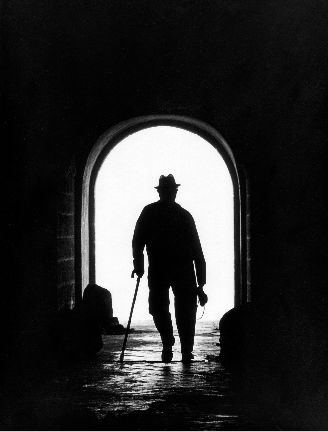We are walking narratives
Over on the Freeroleplay group, Ricardo Gladwell reminded me of the word I’d been looking for: narrative. I can rewrite what I said earlier to:
I think that gaming can more appropriately be described as a new way of finding a narrative. Role-playing is more like reading than writing: none of the players, not even the referee, know what is going to happen “on the next page”. Role-playing is not, as I wrote, just sitting around a campfire telling a story. Neither is it a round-robin tale. It is taking part in the narrative before it becomes a narrative.
Okay, it’s not a perfect fit. But it’s a better one. We’re always looking for a narrative for ourselves.
In real life, we are each a walking narrative, each a protagonist in a story that only we know. Role-playing has an essence of that kind of narrative: each character carrying their own center.
I was using “story” in two ways. At the beginning, I used it in its traditional meaning: a story such as is used in a film or novel. This is what tends to get transferred into games in a way that frustrates players.
The second way, which is the way I don’t understand, is the sense of things we talk about after the game is over. I should have remembered this, having studied schemas and personal narratives in college. Everything we do creates a narrative of some kind. I was fascinated by Bem’s external observer theory, in which a narrative is created to explain a person’s action by that person as if they were an external observer.
That doing this is a skill came up in a Forge discussion about how some players don’t know how to play.
Okay, rearranging your character’s activities for a better story is actually a skill. A skill this player doesn’t have. And before we rush him with bayonets, it isn’t a skill you should automatically have. One doesn’t try and plan out chess for a more exciting game… if a chess player beats his opponent, but does so inefficiently, it’s a legitimate critique to point out how he could have played better, and checkmated 10 moves earlier.
When we say that role-playing games don’t have winners and losers in the traditional sense, this is part of what we mean.
In response to Is role-playing about telling a story?: Role-playing is less about creating a story than about finding a story. And it isn’t even that. Like most things we do with other people, it is a shared experience that we (hopefully) enjoy.
- The Adventure Guide’s Handbook
- Weave fantasy stories around characters that you and your friends create. As a Gods & Monsters Adventure Guide you will present a fantastic world to your players’ characters: all of its great cities, lost ruins, deep forests, and horrendous creatures.
- Wikimedia Commons: The Photographer
- “Old black and white photo: man walking in a tunnel with a camera. Taken at S. Martinho do Porto, West coast of Portugal. It is uncertain whether the man is approaching the camera or walking away from it.” By Joaquim Alves Gaspar.
- [OTE] A Paper Trail to Nowhere
- “Songs have beginings, middles and ends. They have recurring notes. They can include repetitions. They contain a lot of little structures you can learn and then put together improvisationally. What does reality contain? Nothing. There is no culturally inherant structure in it like we see in music. Almost anyone can drum a simple beat. But can anyone as easily help structure a story? No, it’s a skill that you need to learn, if you want to do it.”
- Self-perception theory at Wikipedia
- “Self-perception theory is an account of attitude change developed by psychologist, Daryl Bem. It asserts that we develop our attitudes by observing our own behavior and concluding what attitudes must have caused them.”
More storytelling
- Cinematic roleplaying is an oxymoron
- Cinematic roleplaying always seems to be about reducing player choice. This is a direct result of trying to emulate an entertainment style that by necessity must elevate the director’s choice above character development. Even the best movies require the director to curtail the world in which the action and dialogue takes place.
- Say yes or use the magic 8-ball
- Is “Say yes or roll the dice” something that works in Gods & Monsters? Outlook not so good.
- Spilling sand in the sandbox: tying up loose ends
- How do you maintain consistency in a “plot” that is not under your control?
- The Adventures of Heisenberg’s Cat
- There are no plots without players. A plot is a line graph where dead games go.


Some of the thinking on this has gone into the Adventure Guide’s Handbook.